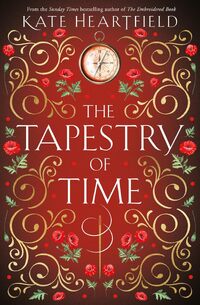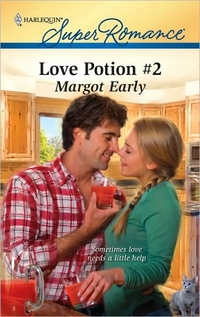 THE TAPESTRY OF TIME |
 Sunshine, secrets, and swoon-worthy stories—June's featured reads are your perfect summer escape. |

Purchase
Harlequin Superromance Romance Excerpt of Love Potion #2 by Margot EarlyLogan, West Virginia The present Cameron McAllister sat at a small damp table in The Last Resort, the downstairs lounge of a Stratton Street hotel, now in its fifth or sixth incarnation. She listened without much interest to Paul Cureux's final set and tried to look like his girlfriend. She felt desperately sad, helplessly jealous and reckless. Her first reckless act of the evening had been to attend a family birthday dinner, where the man she most desired had shown up as her cousin's date. And obviously mad about said cousin. Thus Cameron's desperate sadness and helpless jealousy. The second reckless act had been to pour the contents of an innocent-looking vial into her wine glass and drink it. This was supposed to help her get over the man in question. Her third reckless act had come with Paul's phone call, his insistence that one of his most infatuated fans was at his gig and not getting the message that he had a girlfriend. This was hardly surprising; Paul didn't have a girlfriend. Paul had Cameron. Cameron, who was, she supposed, his best female friend and had been since they were thirteen. Cameron, who was willing to assume the public-only role of his girlfriend. The system worked well enough. The reasons she took part—at parties, gigs and such—were myriad and not something she ever fully examined. Paul's reasons? Well, she wasn't wholly sure about that, either, except that he didn't want a girlfriend and her presence prevented his ever finding one. Though he occasionally slipped away for the night with the kind of woman he believed least likely to ever trouble him again—almost always at out-of-town gigs. Paul was the son of a midwife who brewed love potions for the occasional desperate petitioner. Love potions that he, at least, believed worked. And his sister, Bridget, claimed to have the same powers as his mother, though the little vial Cameron had bought from her (and dumped in her wine) was not a love potion. Paul held up his sister and mother as examples of the inherent untrustworthiness of the female sex. Because women were like this, he said, half-facetiously, he would never marry. Nonsense, in Cameron's opinion. Paul would never marry because he was Peter Pan. He had told her many times that he didn't want so much as a houseplant; the responsibility of marriage and children was not for him. Oh, if only Bridget's concoction to "restore emotional equilibrium" would actually work. Cameron believed in the love potions, believed them to work. But this was a different kind of potion. One that was supposed to help her get over Graham Corbett. And that was absolutely necessary. Cameron's cousin Mary Anne was beautiful, talented and her best friend. Local radio host Graham Corbett was the only man who had interested Cameron in at least three years. But Graham was smitten with Mary Anne, the attraction was mutual, and Cameron just wanted to be home with her dogs and a romance novel so she could start getting over it. If anything, anything, could distract her from the burning jealousy she felt… Cameron was rarely jealous. She made a habit of contentment. Someone had once told her that grateful people are happy people, and she counted her blessings daily. Decent looks, good health, two dogs she loved, her job as director of the Logan County Women's Resource Center, and so much more…. The girl sitting across from her said over the music, "So…where did you two meet?" You two. She meant Cameron and Paul, the supposed couple. The groupie was very pretty. Her name was…Ginny? Jenny? No, Genie. Or Jeannie. She was blonde, with fairy-perfect skin, taller than Cameron and skinny like a model, with high cheekbones and a wide mouth. Paul had said this groupie was "clingy," but why should that bother Paul? What was wrong with having a gorgeous woman infatuated with you? And there was nothing to stop women from becoming infatuated with Paul. He had a fine tenor voice and made audiences laugh by spontaneously creating songs on the spot on whatever subject they requested. Now, Paul gazed at Cameron as he sang an original love song called "Years Ago." "We've known each other forever," Cameron replied, trying for patience. This woman should give up on Paul. She said, "Look, if you really knew him, you wouldn't want him." Cameron was again being reckless—not to mention sounding unlike a girlfriend—but someone should say something to this delusional young woman. And Cameron thought most women received too little good advice when it came to men. "You want him," Ginny-Genie pointed out. Not really. Cameron looked at Paul, his dark hark hair waving ap-pealingly, just messy enough, just long enough and no longer. Cameron cut his hair; she did this because he asked her to, claiming that he worried about his mother and sister using pieces of his hair for witchcraft. Because he didn't simply go to the barber, Cameron suspected he liked her to cut his hair. He was classically handsome, his eyes perpetually alight with mischief. He was tall, lean and broad-shouldered, nothing bulky about him. He looked like a construction worker in a television ad. Or the Marlboro Man. Or an Olympian god. In actual fact, he was a zookeeper and moonlighting folk singer who lived a self-serving existence and believed lasting marriage did not exist. Cameron had no desire to marry him, so this didn't matter. "Look," she said to Ginny, shouting too loudly over the song Paul was pretending to sing to her, "you're very pretty, and you seem intelligent." This might be stretching it, but undoubtedly Ginny-Genie's low self-esteem was part of the reason the girl considered Paul satisfactory. No harm in a little confidence-building. "There are good men out there who would give their eyeteeth to have a girl like you, to marry her. Men who are okay with commitment." Ginny-Genie sipped her own margarita, and there actually did seem to be a look of intelligence—or at least calculation—in her aquamarine eyes. Knowing she'd said too much, Cameron became intent on watching Paul tune his guitar. His hands were big, long-fingered, work-roughened. He had a bandage wrapped awkwardly around one thumb where he'd sliced it open erecting the new monkey enclosure at the zoo. He'd really needed stitches but had insisted he didn't and was now, Cameron saw with much satisfaction and little pity, paying the price. As her eyes again skimmed the lounge, she saw a big, tall man enter the bar with Jonathan Hale, the manager of the local radio station. Cameron squinted through the darkness, and the big man seemed to gaze curiously at her. Hazel eyes, she saw, and those cheekbones. That full mouth. She smiled, and he broke free from Jonathan, crossed the lounge to her table. Cameron stood up to greet her first lover, who had only grown more fantastic-looking with age. Sean Devlin. "Cameron?" he said. "Hi, Sean. What brings you to Logan?" "Actually, I'm living here. I'm the new drama teacher at the high school." Yes, the old one had died suddenly three weeks earlier. He looked down at Ginny-Genie, and Cameron introduced her, as well, not feeling possessive. But he seemed interested in her and asked for her phone number, which she gave him before remembering that she was supposed to be acting like Paul's girlfriend. At the end of the song, Paul asked for requests, said he hadn't made up a song yet that night. Now standing beside Sean, the groupie raised her hand. She was the only one. Paul lifted his eyebrows. "Commitment," she said. "You do not believe one single thing you said in that song," Cameron chided Paul on the way home, remembering the song he'd created on the spot to satisfy the groupie. "I beg to differ. I believe commitment is a beautiful thing, and I said that. And you almost blew our cover flirting with your old flame." "He was never a flame. We were first and foremost friends—not unlike you and I." And she'd made love with each of them once. But there was a certain spice and bittersweet pain to the memory of the long-ago Halloween night she'd spent with Paul. With Sean—nothing, really, though he had been her first. "Anyway," she told Paul, "you believe commitment is a beautiful thing for everyone else." "May I beg to point out that I do have commitment in my life? I'm committed to my job and to my music. I'm just not committed to a house on Stratton Street, a wife and three kids and a golden retriever." He pulled up outside the cabin where she lived. Two dogs got up from the porch. Wolfie was feral and didn't let anyone, even Cameron, touch him, but he sometimes walked in and out of her house and had been known to steal her stuffed animals and bury them in the yard. Mariah was Wolfie's daughter and was as well-trained as was possible under the corrupting influence of her father, who really did look like a wolf, a black wolf with gray under his muzzle. An old guy who, after being attacked by coyotes, had been darted, castrated and stitched up by the zoo veterinarian, then released to Cameron's backyard. After that, Wolfie had decided he sort of trusted Cameron. "Whatever," Cameron muttered, pushing open the passenger door of Paul's pickup truck, an old Toyota 4Runner with camper shell. "Thanks for the ride." She slammed the door and trod up her flagstone path, a rustic path interspersed with dirt and growing things, wilted away this time of year. A moment later, another door slammed. Cameron glanced back. She was greeting Mariah, petting her affectionate dog, while Wolfie kept his distance, still managing to look envious, yearning yet unwilling to be touched. She said, "Hi, Wolfie," then noticed Paul coming toward her in the moonlight. Oh. He was coming in. She moved toward the door. "Want some tea?" "No grass clippings." "I can't believe your own mother is an herbalist and you talk about nettles that way." "It's because she's an herbalist. As a child, I decided that in my adult life I'd never drink anything that tasted like lawn shavings." "You have no adult life." He ignored the jibe. They were walking through the dark hallway and had almost reached the kitchen when he said, "You look like you've lost your best friend, and there's definitely no need. Sean Devlin has arrived, looking romantic, to sweep you off your feet. I remember him as one of the sharper crayons in the box, so your children won't be cretins." "I will never have children," Cameron told him sharply, "unless I adopt." "Ah, yes. I'd forgotten your morbid fear of pregnancy and birth." Cameron had witnessed her older sister, Beatrice, in what she described as "extreme suffering, life-threatening suffering, the screaming-for-hours kind of suffering." Cameron was convinced that no child could pass through her small hips. Paul kept to the original subject. "What's making you so miserable tonight?" "Never mind. Don't trouble yourself about it." "Let me guess—you have lost your best friend. You've lost Mary Anne to Graham Corbett." "Very funny." She took two mugs out of the cabinet, checked that there was water in the kettle and switched on the burner. "It's inevitable that your cousin will marry someone." Cameron's throat knotted. Her eyes felt hot. She wasn't upset because everything was going to change with Mary Anne, that her being married would change everything. That wasn't it at all. Anyhow, Mary Anne and Graham weren't actually engaged. Not yet. "You okay?" The question was far from Paul's usual joking tone. It increased the swelling in her throat. She nodded, jaw taut. From her Salvation Army kitchen table, where he'd pulled out a chair, Paul watched her back. His tomboy friend with her two long golden-brown braids was dressed up, for her, wearing high clogs and some kind of longish, lacy tunic-top over her jeans. She'd been at a family dinner when he'd called her and begged her to come to The Last Resort. He'd used the groupie as an excuse, but that wasn't it. He'd known something was up with Cameron, something that had to do with Mary Anne. He also knew that Cameron, for reasons that made no sense to him, was ever so slightly envious of her cousin. She's got cheekbones! She's tall! Things like that. He saw no reason Cameron should envy anyone. She was the best-looking and most enjoyable woman he knew, that was certain. If there had been a Best Body category in their high school yearbook, she'd have won, hands down. All his classmates had carried fantasies about her. Now, she sounded as if she were about to cry. She spun away from the stove and said, "If you tell anyone what I'm going to tell you, I will never speak to you again and I'll tell that groupie that you want to marry her so she can have your babies." Some small voice in the back of Cameron's head whispered, Reckless... reckless... don't do it. She ignored the voice. She couldn't stop, now that she'd started. "I just don't see why I can't have a normal relationship with a nice man who is actually an adult—someone who knows his own psyche and doesn't project his demons onto me." Paul squinted. "Didn't Sean Devlin beg your phone number tonight, or am I imagining that? Is this going to be another salvo in the Great Crusade for All Men to Have Therapy?" "Forget it!" She spun away again. Cameron, he knew, didn't actually believe all men should have therapy. But she seemed to want some kind of fantasy relationship where she and the man in her life talked about everything, had no secrets from each other, constantly shared every emotion. Sometimes he wanted to point out to her that, in a strictly intellectual sense, she didn't want a boyfriend, she wanted a girlfriend. But now Paul suddenly saw, suddenly understood. She wasn't crying about her friendship with Mary Anne, and she wasn't crying about the general lack of the uninteresting kind of love relationship she thought she wanted; she was crying because she wanted Graham Corbett. The radio guy who looked like an extra on Sex and the City. Talk about someone totally wrong for tomboy Cameron. And Cameron could have virtually any guy she wanted. Paul knew it would be a mistake to say anything. Especially anything on the subject. But he had to try. Excerpt from Love Potion #2 by Margot Early |
|
| |||
|
||||



 © 2003-2025
© 2003-2025